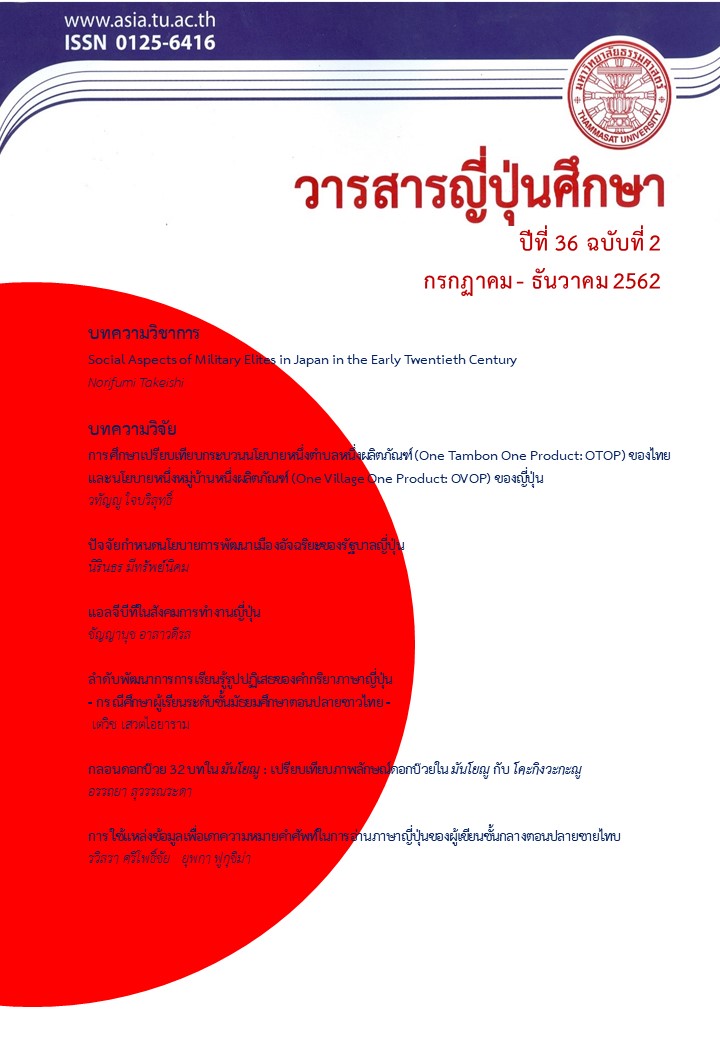ปัจจัยกำหนดนโยบายการพัฒนาเมืองอัจฉริยะของรัฐบาลญี่ปุ่น
Keywords:
ปัจจัยกำหนดนโยบาย, นโยบายสาธารณะ, การพัฒนาเมืองอัจฉริยะ, ญี่ปุ่นAbstract
นโยบายการพัฒนาเมืองอัจฉริยะเป็นนโยบายสาธารณะที่รัฐบาลในหลายประเทศทั่วโลกรวมถึงประเทศญี่ปุ่นและไทยกำลังมีการดำเนินนโยบายนี้ ในขณะที่ญี่ปุ่นมีการดำเนินนโยบายสาธารณะด้านการพัฒนาเมืองอัจฉริยะมาก่อนประเทศไทย กำลังมีความก้าวหน้า มีผลสัมฤทธิ์ที่เป็นรูปธรรม ประเทศไทยซึ่งอยู่ในช่วงเริ่มดำเนินการ กลับต้องเผชิญปัญหาความไม่ต่อเนื่องอันเนื่องมาจากการเปลี่ยนแปลงรัฐบาล แม้ประเทศไทยจะมียุทธศาสตร์ชาติ รวมทั้งแผนพัฒนาเศรษฐกิจและสังคมแห่งชาติ แต่นโยบายสาธารณะมาจากพรรคการเมืองซึ่งโดยมากเลือกที่จะดำเนินนโยบายตามที่หาเสียงไว้ เมื่อมีการเปลี่ยนรัฐบาลบ่อยครั้ง นโยบายจึงมีการเปลี่ยนแปลง การศึกษาปัจจัยกำหนดนโยบายมีความสำคัญ เนื่องจากสัมพันธ์กับกระบวนการสร้างนโยบาย การนำนโยบายไปปฏิบัติ รวมถึงความสำเร็จหรือความล้มเหลวของการนำนโยบายไปปฏิบัติ บทความนี้ศึกษาปัจจัยกำหนดนโยบายการพัฒนาเมืองอัจฉริยะของรัฐบาลญี่ปุ่น อะไรคือสาเหตุและปัจจัยที่ทำให้รัฐบาลญี่ปุ่นดำเนินนโยบายนี้ จากการศึกษาวิจัยเอกสาร และใช้แนวคิดนโยบายสาธารณะเป็นแนวทางในการวิเคราะห์ ผลการศึกษาพบว่ารัฐบาลญี่ปุ่นได้มองปริบทแวดล้อมอย่างรอบด้าน ทั้งปัจจัยภายในประเทศและนอกประเทศ หลายระดับ หลายมิติ เป็นแรงผลักดันที่สำคัญซึ่งประเทศไทยสามารถเรียนรู้เพื่อปรับใช้กับนโยบายของประเทศไทยได้
Downloads
References
(smart city). สืบค้นจาก http://mdes.go.th/assets/portals/1/files/591130_แผนปฏิบัติการ
วาระแห่งชาติ%20smart%20city%202.pdf.
กระทรวงเทคโนโลยีสารสนเทศและการสื่อสาร. (2559). แผนพัฒนาดิจิทัลเพื่อเศรษฐกิจและสังคม. สืบค้นจาก
http://www.mdes.go.th/assets/portals/1/files/590613_4Digital_Economy_Plan-Book.pdf.
จุมพล หนิมพานิช. (2559). การวิเคราะห์นโยบาย ขอบข่าย แนวคิด ทฤษฎีและตัวอย่าง. นนทบุรี: สำนักพิมพ์
มหาวิทยาลัยสุโขทัยธรรมาธิราช.
จุมพล หนิมพานิช. (2562) การกำหนดนโยบายสาธารณะ. เอกสารการสอนชุดวิชานโยบายสาธารณะและ
การวางแผน. นนทบุรี: มหาวิทยาลัยสุโขทัยธรรมาธิราช.
วรรณนภา วามานนท์. (2561). กระบวนการนโยบายสาธารณะในประเทศไทย. วารสารเกษมบัณฑิต,
19(พิเศษ), 197-207.
อิสริยา เฉลิมศิริ. (มีนาคม 2562) การส่งเสริมการลงทุนกิจการพัฒนาพื้นที่เมืองอัจฉริยะ. [จดหมายข่าว].
สืบค้นจาก http://www.ic.or.th/th/ICNews/19/ICeNewsletter_March2019.pdf
Abe, S. (2019, June, 29). Full text of the G20 Osaka leaders’ declaration. The Japan Times.
Retrieved from https://www.japantimes.co.jp/news/2019/06/29/national/full-text-g20-osaka-
leaders-declaration/#.XW7xUCgzbIU.
Agency for Natural Resources and Energy. (2014). ANRE’s Initiatives for Establishing Smart
Communities. Retrieved from https://www.meti.go.jp/english/policy/energy_environment/
smart_community/pdf/201402smartcomunity.pdf.
Akemi T. C. & Christopher G. R. (2015). Smart City Implementation Through Shared Vision of
Social Innovation for Environmental Sustainability: A Case Study of Kitakyushu, Japan.
Social Science Computer Review, 34(6), 757-773.
https://journals.sagepub.com/doi/pdf/10.1177/0894439315611085
Clarisse, P. (2014). Smart cities in Japan: an assessment on the potential for EU-Japan cooperation
and business development. Retrieved from https://www.eu-japan.eu/ sites/default/files
/publications/docs/smartcityjapan.pdf
Dewit, A. (2013). Japan’s Rollout of Smart Cities: What Role for the Citizens? The Asia-Pacific
Journal, 11(2), 1-12.
European Union. (2014). Mapping Smart Cities in the EU. Retrieved from
http://www.europarl.europa.eu/RegData/etudes/etudes/join/2014/507480/IPOL-
ITRE_ET(2014)507480_EN.pdf.
Fietkiewicz, K. J., & Stock, W. G. (2015). Are Japanese Cities? An empirical investigation of
infrastructures and governmental programs in Tokyo, Yokohama, Osaka, and Kyoto.
Gao, W., Fan L., Ushifusa Y., Gu, Q., & Ren, J. (2015). Possibility and Challenge of Smart
Community in Japan. Procedia Social and Behavioral Sciences, 216, 109-118.
Iba, K., Yokoyama R., & Koyanagi K. (2012). Current status of implementation for smart and
resilient community in Japan. Retrieved from
https://ieeexplore.ieee.org/stamp/stamp.jsp?tp=&arnumber=6463954.
Japan Smart Community Alliance. (2015). Smart Community-Japan’s Experience. Retrieved from
https://www.smart-japan.org/english/vcms_lf/Resources/JSCApamphlet_eng_web.pdf.
Jingye, L., & Takehiro, T. (2015). Practical process for introducing smart business continuity
management of smart city in Japan. Procedia Engineering, 146, 288-295.
Ministry of Economy, Trade and Industry. Introduction of Smart Community. Retrieved from
https://www.meti.go.jp/english/policy/energy_environment/smart_community/about/
fallback.html.
Nakayama, D. & Onodera C. (n.d.). Future City Yokohama - Yokohama Smart City Project. Retrieved
from http://www.iuc.eu/japan-en/bestpractice/yokohama/.
Nobutoki, M., Yamagishi, K., Ariyoshi, Y., & Taniguchi, M. (2012, January, 31). Smart-city concept
offers solutions to global problems. The Japan Times, 10-11.
Siegal, R. P. (2015). Japan Smart Cities Project Wraps Up With Impressive Results. Retrieved
from https://www.triplepundit.com/story/2015/japan-smart-cities-project-wraps-impressive-
results/31496.
Smart City Hub. (2017). Japans Super Smart Society 5.0. Retrieved from https://smartcityhub.com/
governance-economy/japan-smart-society/.
Smart Cities World news team. (2019, July, 2). Smart cities spending to reach $189 billion in 2023.
Smart Cities World. Retrieved from https://www.smartcitiesworld.net/news/news/smart-cities-
spending-to-reach-189-billion-in-2023-4327.
Tokyo Development Learning Center. (2014). Finding New Solutions through Building Smart Cities.
Retrieved from https://www.mofa.go.jp/files/000452656.pdf.
United Naions. (2014). UN World Urbanization Prospects: The 2014 Revision. Retrieved 19 July
2018 from https://esa.un.org/ unpd/wup/publications/files/wup2014-report.pdf.
Wongbumru, T., & Dewancker, B. (2014). Smart Communities for Future Development: Lessons from
Japan. BUILT, 3, 69-75.
World Bank. (n.d.). Urban Development. Retrieved from https://data.worldbank.org/topic/urban-
development.




